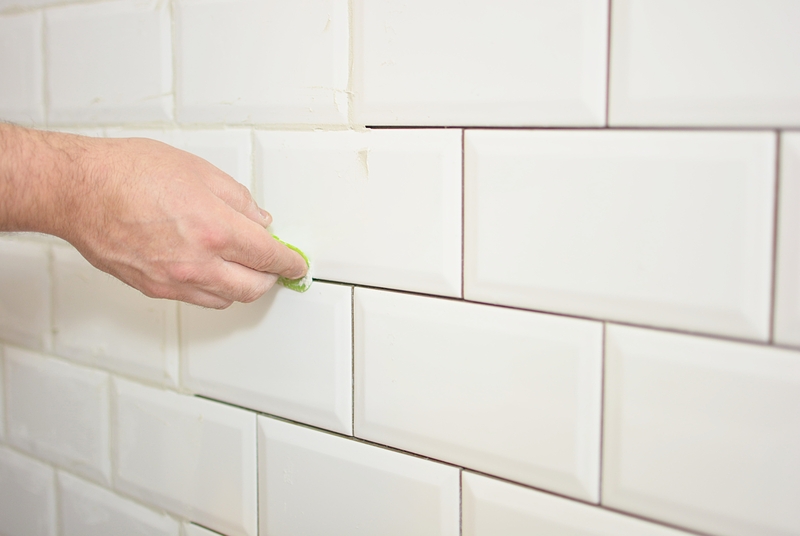Have you ever wondered if tile grout is truly waterproof?
The answer might surprise you. Understanding the intricacies of tile grout composition and the factors that influence its water resistance is essential for maintaining the integrity of your tiled surfaces. However, the question of whether tile grout can be considered inherently waterproof requires a closer look. By exploring sealing techniques, maintenance practices, and common misconceptions surrounding grout waterproofing, you will gain valuable insights into this crucial aspect of tile installation.
Understanding Tile Grout Composition
- Have you ever wondered what exactly makes up the composition of tile grout? Understanding tile grout composition is crucial for successful tiling projects. Grout materials typically consist of a blend of cement, water, and additives. Cement provides the structural integrity to the grout, ensuring it holds up over time. Water is essential for activating the cement and allowing the grout to set properly. Additives such as polymer can enhance the grout’s flexibility and water resistance.
- When it comes to grout application, the process involves mixing the grout to a smooth consistency before applying it between tiles. Using a rubber float, spread the grout diagonally across the tile joints, ensuring they’re completely filled. Excess grout should be removed immediately with a damp sponge to prevent it from drying on the tile surface. After allowing the grout to set for a specified time, typically 15-30 minutes, a final cleaning with a dry cloth will polish the tiles to reveal a clean, finished look. Understanding the composition and application of tile grout is essential for achieving a professional and long-lasting result.
Factors Influencing Grout Water Resistance
- Grout water resistance can be significantly influenced by various factors inherent to the grout composition and application process. Grout additives play a crucial role in enhancing water resistance. Additives like latex or polymer can improve the overall performance of the grout by making it more resistant to water penetration. These additives create a denser grout that minimizes water absorption, thus increasing its waterproofing properties.
- Furthermore, proper grout application is essential for achieving optimal water resistance. The correct mixing ratio of grout to water and the thorough application of grout into the tile joints are vital. Inadequate mixing or uneven application can lead to weakened water resistance, allowing moisture to seep through and potentially damage the underlying surfaces.

Sealing Techniques for Tile Grout
- To enhance the water resistance of your tile grout further, consider implementing effective sealing techniques. Grout sealing is a crucial step in waterproofing techniques that can significantly prolong the lifespan of your tiled surfaces. There are two main types of grout sealers: penetrating sealers and membrane-forming sealers. Penetrating sealers are absorbed into the grout, creating a protective barrier that repels water and stains without changing the grout’s appearance. On the other hand, membrane-forming sealers create a barrier on the surface of the grout, providing enhanced protection against moisture and contaminants.
- When applying a grout sealer, ensure that the grout lines are clean and dry to allow for proper adhesion and penetration of the sealer. Use a brush or applicator specifically designed for sealers to ensure even coverage and avoid excess sealer pooling on the tile surface. It’s recommended to reseal your grout periodically, as sealers can wear off over time due to cleaning agents and foot traffic. By incorporating proper grout sealing techniques, you can effectively waterproof your tile grout and maintain the integrity of your tiled surfaces.
Maintaining Waterproof Grout
- Ensuring the longevity of waterproof grout requires regular maintenance through proper cleaning and resealing techniques. Grout cleaning is essential to prevent the buildup of mold, mildew, and stains that can compromise its waterproof properties. To maintain waterproof grout effectively, start by routinely cleaning the grout lines with a pH-neutral cleaner and a brush to remove dirt and grime. Avoid using harsh chemicals that can deteriorate the grout over time.
- In addition to grout cleaning, moisture prevention is crucial for maintaining waterproof grout. Be sure to inspect the grout regularly for any signs of cracking or deterioration, as these can allow water to seep in. Address any issues promptly by resealing the grout lines to restore their waterproof barrier. Resealing every 1-2 years, or as recommended by the manufacturer, will help maintain the grout’s waterproof properties and prolong its lifespan.
Common Misconceptions About Grout Waterproofing
Despite common beliefs, waterproofing grout isn’t always as straightforward as it seems. There are several misconceptions and myths surrounding the waterproofing of grout that can lead to ineffective sealing and potential water damage.
- One common misconception is that all grout is inherently waterproof, which isn’t true. While some grout types have water-resistant properties, they aren’t completely waterproof without proper sealing. Another myth is that using waterproofing products alone is enough to make grout waterproof. While these products can enhance the water resistance of grout, they aren’t foolproof solutions. Proper application and periodic resealing are essential to maintain the effectiveness of waterproofing products.
- It’s important to consider alternative methods of waterproofing, such as epoxy grout, which is naturally more resistant to water penetration than traditional cement-based grout. Epoxy grout is a reliable option for areas prone to water exposure, like showers or kitchen backsplashes. Understanding these grout misconceptions and exploring different waterproofing alternatives can help you make informed decisions when sealing your tile grout.
Conclusion
In conclusion, while tile grout isn’t inherently waterproof, there are techniques and products available to enhance its water resistance. Understanding the composition of grout, factors influencing its water resistance, proper sealing techniques, and regular maintenance can help keep your grout waterproof and in good condition. By dispelling common misconceptions about grout waterproofing, you can ensure that your tiled surfaces remain durable and aesthetically pleasing for years to come.